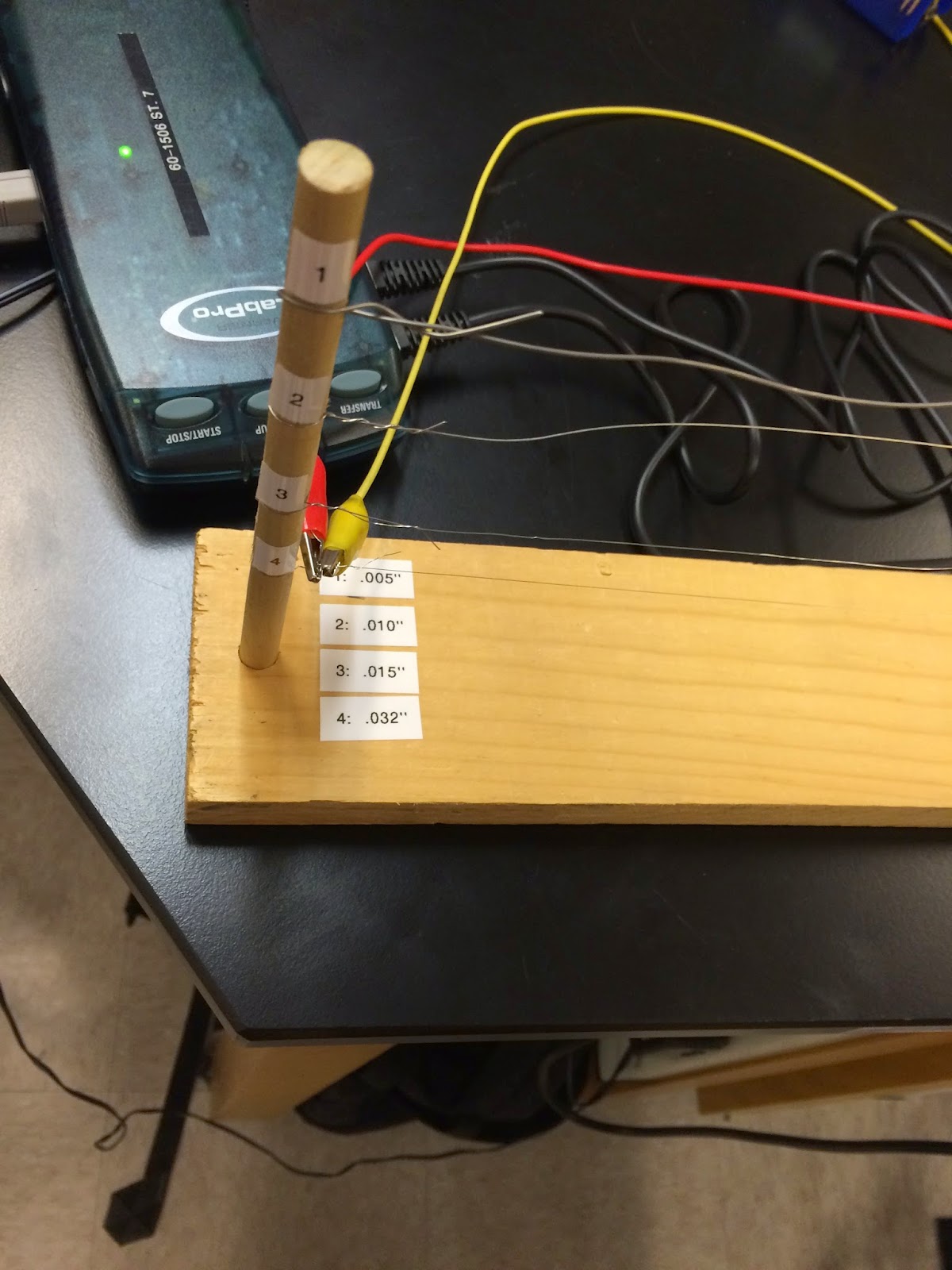Lighting a Bulb
With
a bulb, a battery, and a piece of wire: two different ways were discovered to
put these three items together to make a bulb light up.

Model with a Current
One type of current can be made with a battery, a wire, and
a bulb. A battery gives energy, evengy
gets used up in the bulb, and the wire goes from the bulb to the battery to
return potential difference. An ammeter was
used to measure the current going through the wires and to see if the current
changed at all when the ammeter was placed in different spots. The results were that the current is equal
everywhere.
 |
| current = 200 |
 |
| current = 200 |

 |
| current is equal everywhere |
Ohm’s Law

We looked at the relationship between the applied voltage
across a resistor (an old toaster wire) and the current through the
resistor. As the voltage across the
resistor increased, the current through the resistor also increased. Based on the graph, it can be seen that they
have a linear relationship which means that they are directly proportional to
one another. The equation of our line is
y = 7.256 X where y is the voltage and x is the current. Which gives us the relationship between
voltage and current as V = constant * I
 |
| linear relationship between V and I |

Next, we took a type of fence that had four different wires
connected across it each with a different thickness. As the wires were moved from the thinnest
wire to the thickest wire, the slope of the line decreased respectively. Also, when the length of the wires were
decreased, the slope of the line decreased as well. It can be seen that the slope of the line
found in these graphs and also the previous graph with the toaster wire is the
resistance. After studying these graphs,
it can be seen that the ticker the wire, the smaller the resistance, also the
shorter the wire the smaller the resistance.

 |
| slope goes down as thickness goes up |
 |
| slope is actually resistance |





 We looked at the relationship between the applied voltage
across a resistor (an old toaster wire) and the current through the
resistor. As the voltage across the
resistor increased, the current through the resistor also increased. Based on the graph, it can be seen that they
have a linear relationship which means that they are directly proportional to
one another. The equation of our line is
y = 7.256 X where y is the voltage and x is the current. Which gives us the relationship between
voltage and current as V = constant * I
We looked at the relationship between the applied voltage
across a resistor (an old toaster wire) and the current through the
resistor. As the voltage across the
resistor increased, the current through the resistor also increased. Based on the graph, it can be seen that they
have a linear relationship which means that they are directly proportional to
one another. The equation of our line is
y = 7.256 X where y is the voltage and x is the current. Which gives us the relationship between
voltage and current as V = constant * I 
 Next, we took a type of fence that had four different wires
connected across it each with a different thickness. As the wires were moved from the thinnest
wire to the thickest wire, the slope of the line decreased respectively. Also, when the length of the wires were
decreased, the slope of the line decreased as well. It can be seen that the slope of the line
found in these graphs and also the previous graph with the toaster wire is the
resistance. After studying these graphs,
it can be seen that the ticker the wire, the smaller the resistance, also the
shorter the wire the smaller the resistance.
Next, we took a type of fence that had four different wires
connected across it each with a different thickness. As the wires were moved from the thinnest
wire to the thickest wire, the slope of the line decreased respectively. Also, when the length of the wires were
decreased, the slope of the line decreased as well. It can be seen that the slope of the line
found in these graphs and also the previous graph with the toaster wire is the
resistance. After studying these graphs,
it can be seen that the ticker the wire, the smaller the resistance, also the
shorter the wire the smaller the resistance. 







No comments:
Post a Comment